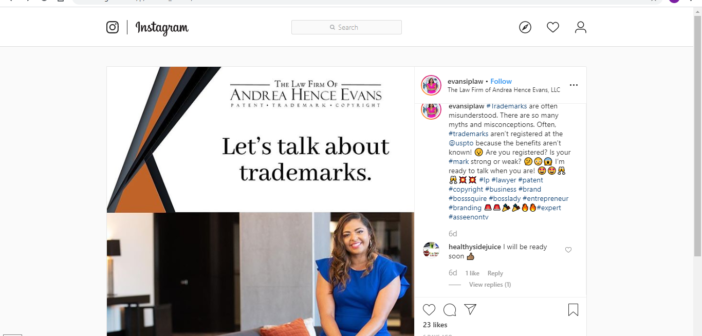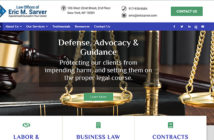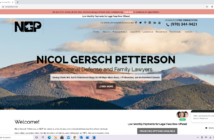Social media, speaking, book authorship, conference attendance, and giving back have delivered a steady flow of individual and startup clients to this solo.
Andrea Evans launched her solo intellectual property practice in the Washington DC area after working for five years as an attorney at the US Patent and Trademark office.
The consensus among her colleagues was that she should cash in on her experience by landing major corporations as clients. Early on, she did some work for IBM and other big companies, and was grateful for it. But over the course of the 12 years since she hung her shingle, Evans has charted a different course, aiming to become “the go-to patent and trademark attorney for individual inventors and entrepreneurs.” https://evansiplaw.com/
Evans has built a successful practice in that niche using Instagram, Twitter, and Facebook, and their live-streaming apps, a couple of self-published books, a monthly email newsletter, and a busy schedule of speaking engagements at conferences and trade shows. All of those efforts eventually helped open the door to an ongoing role for Evans on a nationally-broadcast PBS television show.
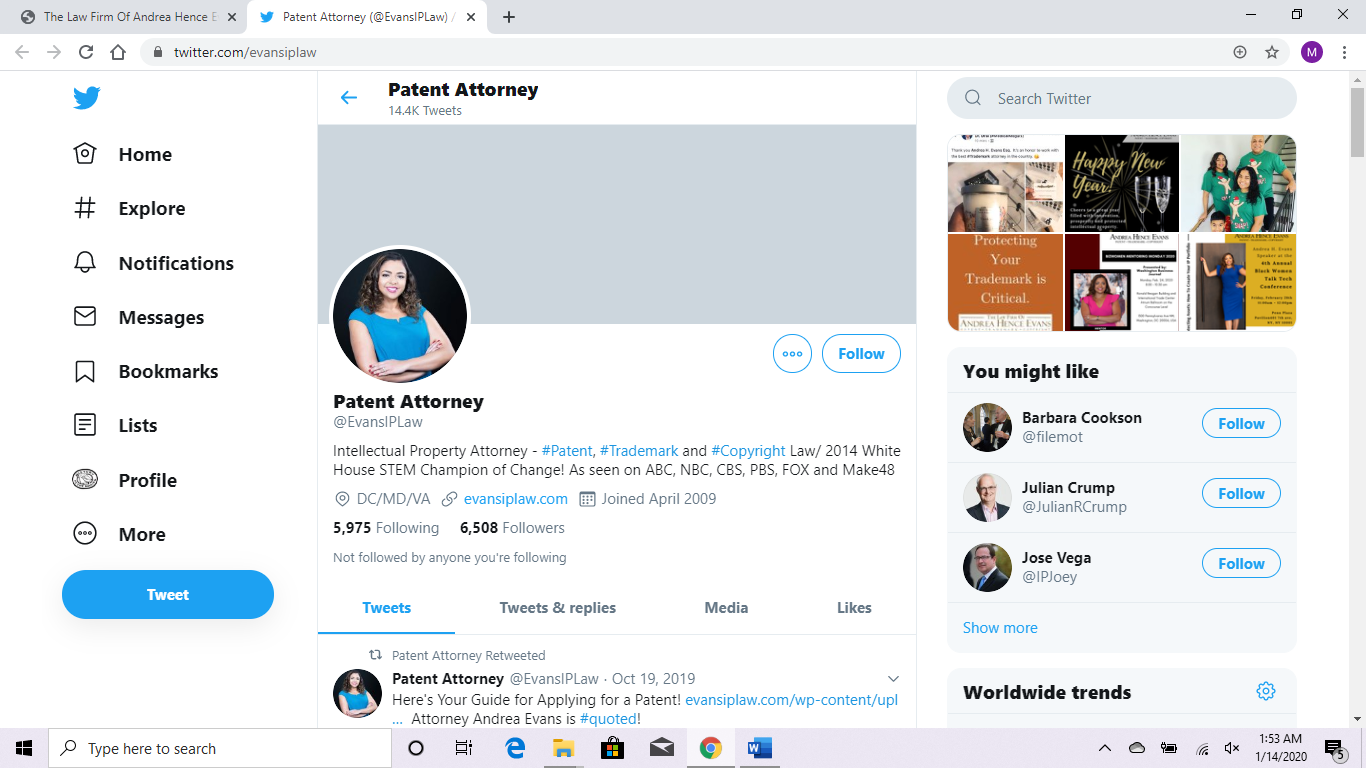
Boosting Her Following on Social Media
As it happens, Evans took the first steps on the path to that high-profile gig while watching television. Soon after launching her practice, when Twitter was a novelty, she was inspired to open an account by the hosts of the Today Show, who did so on air and sent their first tweet while exclaiming that Twitter was “the next big thing that everybody would be talking about.” Her first tweets, Evans says, were on the order of “Hey, I’m a patent attorney,” which virtually no one noticed.
That soon changed, thanks to another of her favorite television shows, Shark Tank. During episodes of the show, on which budding entrepreneurs get a shot at persuading a panel of wealthy investors to bankroll their ventures. she and other fans carried on a running dialogue on Twitter, using the #SharkTank hashtag. Whenever the topic of patents or trademarks came up, she would chime in with astute tweets about the law in those areas, some of which were retweeted, including by participants in the show. “That’s how I was able to grow my Twitter followers,” she says.
It also opened other doors. “Reporters began contacting me saying they had noticed my tweets and wondered if I could answer some questions. So using social media afforded me the opportunity to expand my network and also be interviewed by national publications and speak on national platforms.”
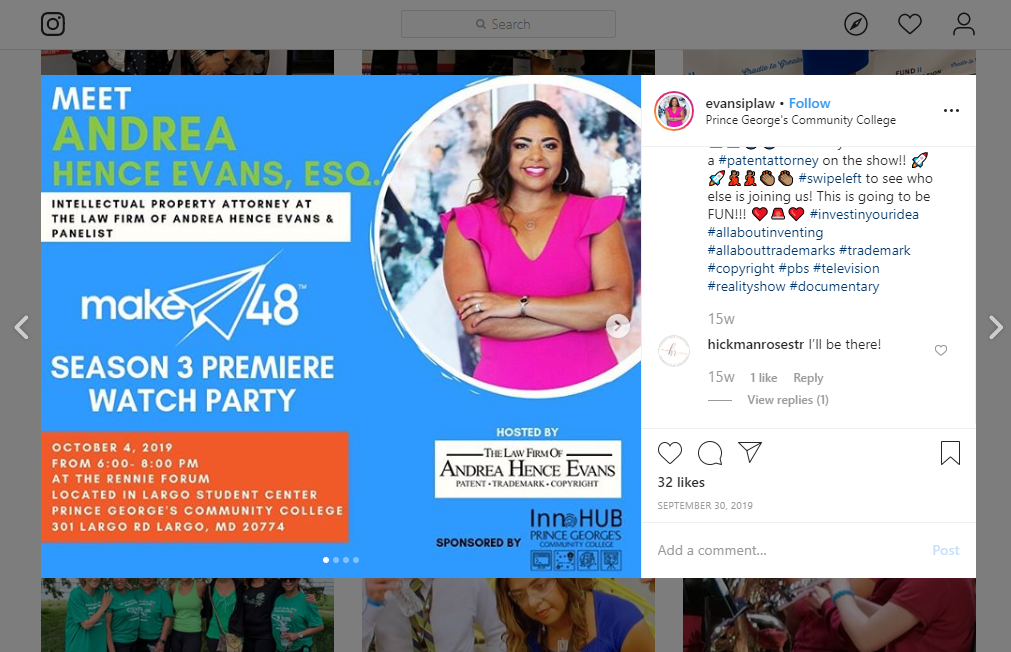
One of her most prominent platforms these days is serving as one of two resident patent-law advisors on the PBS TV show Make48, in which teams compete to come up with a marketable invention, build a prototype, and pitch it to a panel of judges, all within 48 hours. Evans got tapped for that gig through connections she made on the speakers circuit at trade shows. She regularly attends the annual hardware, housewares and toy shows — events that draw lots of entrepreneurs pitching their gadgets to retailers — people who could need a patent and trademark lawyer, someday if not now.
From the floor at the trade shows, Evans sometimes live-streams herself on Facebook Live or Twitter’s Periscope video-streaming app, walking past exhibits with a selfie stick, chatting with vendors, commenting along the way about the importance of securing patent and trademark protection for innovative products.
“I love live-streaming and taking my audience with me to conferences and shows,” Evans says. “Many have thanked me for sharing, and they’ve even attended the shows based on my live streams. Like any social media, it’s another opportunity to showcase and humanize yourself, and I definitely recommend it.”
Evans is prominent on the speakers circuit these days as a member of the board of directors of the United Inventors Association, a nonprofit group with a mission to educate and empower small and independent inventors. https://uiausa.org/board-members/ One of the association’s main outreach efforts is hosting events at trade shows including pitch competitions, which she frequently judges. Evans also appears regularly at conferences as a featured speaker on topics such as how to make a good pitch, how to sell your invention, and how to create a strong brand.
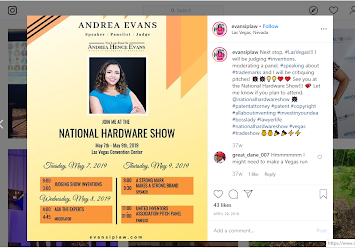
“I jump on any speaking opportunity that I get,” says Evans. That’s easy for her, a veteran of high school debate, talent shows, and teen pageants. It might be a bigger stretch for others, but there are ways that anyone can break in, she says.
“I think that as a young attorney you need to take advantage of any opportunity to get the word out about your services and your skill set, and to be able to carve out a niche for yourself as an expert in your industry. It is definitely a good start to speak at any conference, large or small. There’s always a way, depending on your skill set and the type of law that you practice,” Evans adds. “Even if you are not in a position to be a speaker at those conferences, you can go and ask questions and network in a way that will lead people who meet you to want to continue the conversation and follow up with you.”
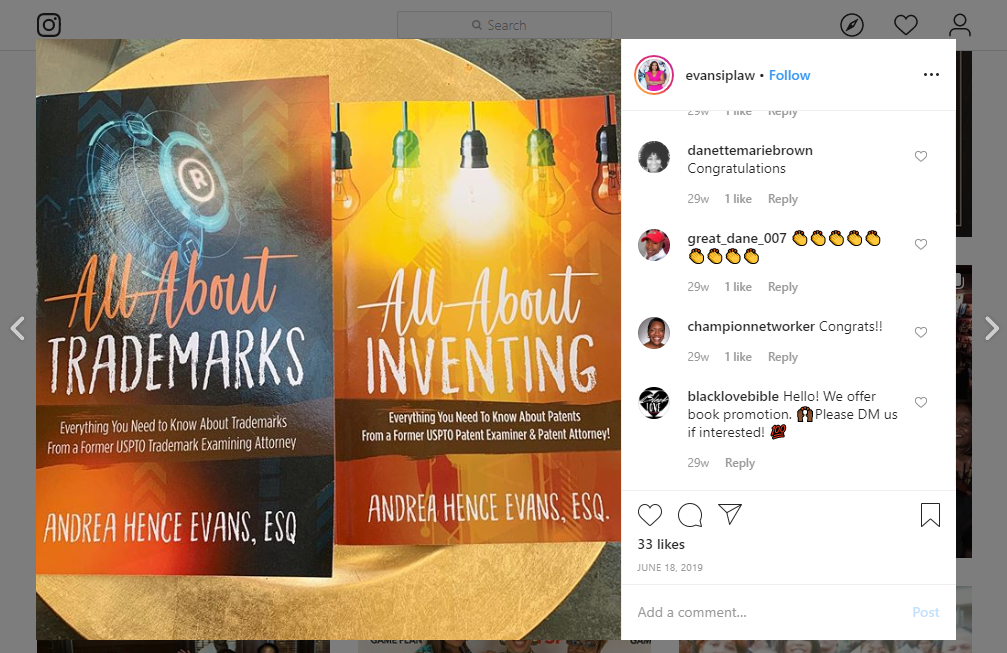
Books As a Calling Card
The two books that Evans has self-published have proved to be an effective way for her to keep the door open to further conversations with potential clients.
“After I speak at a trade show or conference, there are always a lot of people with questions who may not be ready to pay an attorney’s rate to get them answered,” she says. Her books, which she offers for sale whenever she speaks, are an inexpensive way for them to get some general answers. Her contact information appears prominently in the volumes, making it easy for them to reach out to her when they’re ready to take the next step.
All About Inventing “walks inventors through the process of going from an idea that cannot be protected to a real invention, and then through the patent process,” she says. Her other book, Everything You Need to Know About Trademarks, is written for another set of prospective clients that she encounters on a different speaker circuit she frequents: conferences for entrepreneurs seeking to build their brands.
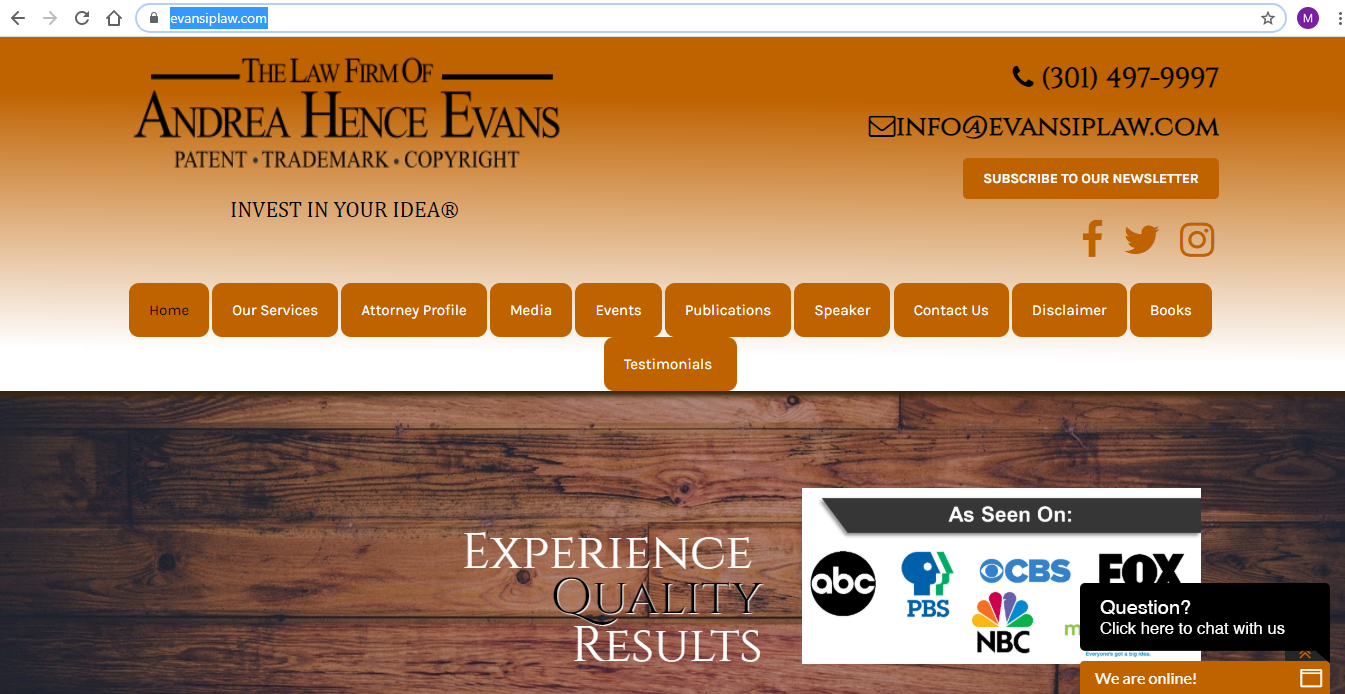
Newsletter Keeps Her Front of Mind
Evans continuously adds email addresses of people she meets to a list that receives her firm newsletter. The list has grown from about 1,000 to 12,000 over the decade since she launched her practice.
The newsletter “definitely helps me to stay on top of people’s minds, and to let them know that I’m still here,” she says. She includes notices of her upcoming speaking engagements, and other conferences and events that might be of interest to her client base, as well as news and current events pertaining to intellectual property law.
Evans also offers lots of glimpses of her personal life in her newsletter and even more so on social media platforms. That is especially true of Instagram, https://www.instagram.com/evansiplaw/?hl=en, where her law firm’s account is filled with updates on her daughter’s progress through school, her trips with her husband, and reunions with old friends.
“I could post law-related memes and pictures and occasionally I do. But where I get the most engagement is when I post a picture of my family putting up a Christmas tree, or me at an event, because let’s face it, that’s what the platform is really for,” says Evans, who adds that the personal posts serve a business purpose. They show that “I’m an entrepreneur and a business owner but first, I’m a human.”
Posts of a personal nature also populate her firm’s Facebook page, though overall, it is more businesslike, with lots of links to articles about recent developments in patent and trademark law https://www.facebook.com/evansiplaw/. To create space for an even more focused discussion of legal issues pertinent to inventors and entrepreneurs, Evans created a closed Facebook group for those who ask to join. She formed the group, All About Patents, Trademarks & Copyrights, about a year ago, “to build a community for people interested in the subject matter,” she says. “In less than a year, it had grown to over 1,000 people. We post entertaining and educational topics and current events–from celebrity news about trademarks to general questions from members about intellectual property.”
Though Evans has extensive experience on an array of social media platforms by now, it is still a mystery to her as to why some posts catch on while others land with a dud. One of her surprise hits was an off-the-cuff riff about patents, trademarks and copyright that she live-streamed on the Twitter app Periscope. “I don’t know what the deal is to make something trend but it was shared enough that it ended up being one of the top trending posts on there,” she says.
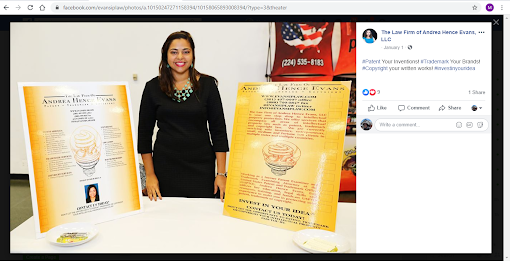
‘Showing What You’re Passionate About’
One of her endeavors outside of the law reflects something of her own personal journey.
Some of her family members had careers in science and engineering, which helped steer her down a path toward earning a degree in engineering at Spelman College on a NASA scholarship, and then on to Georgetown Law School and the USPTO. When her own daughter began her schooling and there was no STEM-related instruction in the curriculum, Evans started an extracurricular program for her own daughter’s school, which has since evolved into a nonprofit organization called KidGINEER. The program sponsors after-school and Saturday programs covering topics ranging from chemical engineering to video game design to robotics, aiming to get kids interested from a very early age in science and math careers.
The program, which has been around for 10 years, enlists high school students as volunteers, some of whom have by now gone to college. One of those students recently retained her to file a patent on something she had invented. In other instances, parents of students in the program have sent clients her way. “That’s not why I set out to start KidGINEER. That’s secondary to the program, but it’s a nice bonus,” Evans says. “And it’s just another opportunity to humanize yourself as a lawyer and show what you’re passionate about.”
That pays off in her practice in a more indirect way, she adds. “One thing that’s important about being a lawyer that people often forget is that when clients hire attorneys, they hire people that they know, like, and trust. They want authenticity, and part of being authentic as an attorney is showing what you’re passionate about and being involved in the community,” Evans says. “If there is someone with that same passion and they learn to trust you they will refer business to you and hopefully work with you in the future.”

